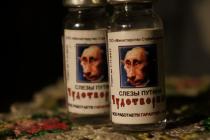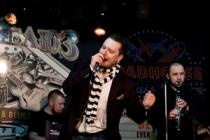Mikhail Mishuris began his career as a blues performer around 1994. At that time he lived in Novosibirsk and there he organized his first blues band, or rather, the New Blues Association (NAB). The Association was the only band in the region focused on pure blues, not rock and blues-rock. From 1994 to 1997 N.A. B. She regularly performed in Novosibirsk and the surrounding area and, practically, any concert of Mishuris and his comrades took place with a large crowd of public and the attention of the local press and TV. The ensemble's repertoire consisted of well-known blues (always in original arrangement), as well as songs composed by the members of the group (mainly by Mishuris himself).
In the summer of 1997, Mikhail Mishuris went to the United States, in his words, "to study the blues." For several months he actively attends concerts in Chicago - the main city of blues, and also takes lessons in vocals, harmonica and guitar at "Old Town School Of Folk Music". Within the walls of this institution, it is customary to organize blues bands, one of which was vocalist Mikhail.
In the fall of 1997, Mikhail returned home and immediately moved to Moscow. Friends from the Association joined him and, having changed the name to "Blues Passengers", the musicians began to perform successfully in Moscow and outside of it. Mikhail immediately attracted the sophisticated metropolitan audience not only with his unusually expressive singing, but also with the unconditional talent of the showman - tricks were used, spied on in the blues clubs of Chicago, but their own were also invented. The audience especially liked the singing of Mikhail without a microphone and his "walk" along the bar counter.
The financial crisis of 1998 made the existence of "Blues Passengers" impossible, and Mikhail gathered the next team in Moscow. For some time, together with the "Nichya" group, Mishuris performed with the author's program in Russian, but later returned to the blues in the "Mishuris Blues Band".
A real success for Mikhail was his participation in "Mishouris And His Swingin’ Orchestra ", whose triumphant debut took place at the big Moscow festival Blues.ru 2001. In a short time, the orchestra firmly entered a kind of major league of Moscow ensembles. The mixture of boogie-woogie, blues, jazz and rockabilly worked flawlessly - the audience was delighted. In addition to the mighty baritone Mishuris, this was facilitated, of course, by the virtuoso playing of the musicians, especially the guitarist Vadim Ivaschenko and the pianist Oleg Gorchakov. Together with them, in 2003, Mikhail creates the next collective "Mishouris Blues Band".
Since 2008, the team has been performing in a renewed lineup. Andrey Bessonov's blues clarinet gives the band a unique "New Orleans" accent. Since 2009, a second vocalist has appeared in the group - Galina Kiseleva. The traditional Chicago blues performed by the "Mishouris Blues Band" sounded unexpectedly fresh and unusual. From that time on, the great keyboard player Nikolai Dobkin came to the group and, thus, a friendly, cheerful and truly blues collective was finally formed.
"Mishouris Blues Band":
Mikhail Mishuris - vocals,
Denis Shevchenko - guitar,
Galina Kiseleva - bass guitar, vocals,
Andrey Bessonov - clarinet,
Daniil Soldatov - drums,
Nikolay Dobkin - Hammond organ.
“The blues is the optimism of a pessimist who preaches unbridled delight because tomorrow is the end” (Pol Whiteman).
I don’t know how anyone else, but for me one of the most favorite Moscow blues bands is Misha's gang ... For creative restlessness, constant search for new forms, a sensitive attitude towards their listeners, but without commercial servility. The stars in the forehead have long been burned out, leaving a fertile soil of charisma for healthy development and flowering of talent to the delight of lovers of the good old, but such a multifaceted blues.
Mikhail Mishuris is from Novosibirsk.
The passion for blues began with the English - Cream, Free, Ten Years After - the first near-blues influences, but John Mayall instilled and developed a real interest in the root blues in him (and fate gave Misha a chance to tell him about it personally ...). According to Misha, at first he was not very interested in the real "black" American blues. but thanks to the powerful temperament of a man named Howlin Wolf, he quickly got involved and so found his music.
Loves almost all the classic blues of the 40s-50s (Howlin Wolf, Muddy Waters, Little Walter, Otis Rush, BB King, Elmore James, John lee Hooker, Lonnie Johnson, Johnny Shines, Bobby Bland, Big Joe Turner, Louis Jordan , Jimmi Witherspoon, Little Milton ...)
Of the modern, he is interested in the products of the Fat Possum company, musicians with soul and gospel influences (Holmes Brothers, Terry Evans, Ben Harper, Snooks Eaglin, etc.). From non-blues - soul (Marvin Gaye, Curtis Mayfield, Isaak Hayes, The Temptations) and a little exotic like Bob Marley, Tom Waits, Buena Vista Social Club and Ibrahim Ferrer. Strange relationship with the Rolling Stones - sometimes he loves, sometimes he doesn't love ..
What he dislikes is "white" guitar blues-rock, rockabilly, rock-n-roll, neo-swinging, there is a cool attitude towards Queen, Yes, Led Zeppelin and, sorry, The Beatles.
It was with such a base of preferences and teachings that Mikhail began his career as a blues performer around 1994. He organized his first blues band, the New Blues Association (NAB). The Association was the only band in the region focused on pure blues, rather than rock and blues-rock. From 1994 to 1997, N.A. B regularly performed in Novosibirsk and the surrounding area and, practically, any concert of Mishuris and his comrades took place with a large crowd of public and the attention of the local press and TV.
The ensemble's repertoire consisted of well-known blues (always in original arrangement), as well as songs composed by the members of the group (mainly by Mishuris himself). One of the author's songs “No Place To Go” later got into the famous album-collection of Russian blues “I Will Not See Mississippi”. This composition remains the only studio recording of the New Blues Association.
In the summer of 1997, Mishuris travels to the United States, in his words, "to study the blues." For several months he actively attends concerts in Chicago - the main city of blues, and also takes lessons in vocals, harmonica and guitar at the Old Town School Of Folk Music. Within the walls of this institution, it is customary to organize blues bands, one of which was vocalist Mikhail. As part of this American group, in August 1997, Mishouris performed at the legendary Buddy Guy’s Legends at the Luther Ellison memorial evening.
In the fall of 1997, Mikhail returned home and immediately moved to Moscow. His fellows from the Association join him and, having changed the name to Blues Passengers, the musicians begin to perform successfully in Moscow and abroad. Mikhail immediately attracted the sophisticated metropolitan audience not only with his unusually expressive singing, but also with the unconditional talent of a showman, using tricks spied in the blues clubs of Chicago and his own inventions. The audience was especially fond of Mikhail's singing without a microphone and his “walks” around the bar.
However, the project Mishouris and his Swinging Orchestra, which existed from about 2001 to 2003, received the greatest fame and, I am not afraid of this word, popularity. The concept of "boring blues" proposed by Mikhail was taken as a basis, and the orchestra in a short time firmly entered a kind of major league of Moscow ensembles. The mixture of boogie-woogie, blues, jazz and rockabilly worked flawlessly - the audience was delighted. In addition to the mighty baritone Mishuris, this was facilitated, of course, by the virtuoso playing of the musicians.
At various times, many musicians have gone through the project, who today are successfully implementing their solo projects: the virtuoso guitarist Vadim Ivaschenko (The Boneshakers), the brilliant bassoonist and many-sided keyboard player Nikolai Dobkin (participant in many projects, both classical and pop), together with divine clarinetist Sergei Shitov (soloist of the Presidential Orchestra, his own project "26Hz") included the brass section of the project, the original saxophonist Ilya Alekhin (SaltPeanuts), keyboardist Oleg Gorchakov (Cool Cats), etc., etc.
Despite the success with the public (and commercial, as well), according to Misha, "it was all terribly far from the blues and I quit to make the kind of music that I really love." This is how the Mishouris blues band was assembled, which regularly performs in Moscow and other cities, despite the change in format towards less commercial attractiveness, is not only alive, but also recorded a CD "I got money", completely consisting of the author's material. Misha is very proud of this disc. And I understand him, for I watched from the inside all the "suffering" of "bearing, birth and representation in the Light" of this beautiful "child".
In conclusion, I would like to quote Misha's answer to the standard question of any journalist: How do you find inspiration for new compositions? —
“Inspiration always comes from comprehending life situations: sometimes funny, sometimes sad. So the themes for the songs come in. Well, music is composed, as a rule, under the impression of other music. It can be old music, new, jazz, blues, soul, rock - it doesn't matter. The main thing is that something has sunk into the soul. "
The full collection of recordings can be listened to here pesni.fm/search/Mishouris+Blues+Band
And here mishouris-blues.livejournal.com/ also see)))
Mishouris Blues Band
2005
Mishouris Blues Band is one of the brightest domestic blues bands under the leadership of Novosibirsk singer Mikhail Mishouris Page address https://www.realrocks.ru/mishouris Description Mishouris Blues Band is one of the brightest and most popular Russian blues bands, founded in Moscow more than 10 years ago by the Novosibirsk singer Mikhail Mishuris - a recognized connoisseur of style, the owner of a unique blues baritone and powerful artistic charisma, who went through a 20-year career from Siberia to Chicago before assembling his "dream team" in Moscow. The main repertoire of the group is high-class Chicago electric blues (songs by such authors as Muddy Waters, B.B. King, Ray Charles, Howlin Wolf, Willie Dixon). Members Sites mishouris.ru History Mikhail Mishuris began his career as a blues performer in 1994, organizing the first blues band in the region - the New Blues Association. In 1997, Mishuris travels to the USA, where in the main blues city - Chicago - he takes vocal, harmonica and guitar lessons at Old Town School Of Folk Music, and also performs at the legendary Buddy Guy’s Legends club. Arriving after the "blues school" in Moscow, Mikhail immediately attracted the sophisticated metropolitan audience not only with his unusually expressive singing, but also with the unconditional talent of the showman - both tricks, spied on in the blues clubs of Chicago, and his own were used. The audience was especially fond of Mikhail's singing without a microphone and his "walks" along the bar counters. In his book on the Russian blues "Russia Gets The Blues" American professor Michael Urban devoted a lot of space to Mikhail Mishuris and even called him the best Russian blues singer. In 1998 Mishuris recorded the successful near-blues author's album "Hello, Sailor!" in Russian, the songs from which hit the music TV channels, but quickly returned to the previously outlined path. A real success for Mikhail was the non-swinging project "Mishouris And His Swingin 'Orchestra" - a mixture of boogie-woogie, blues, jazz and rockabilly with the participation of many successful Moscow musicians. 30 or more concerts a month is an absolute record for such bands. Since 2008, Mikhail Mishuris returned to pure blues, having assembled the classic Mishouris Blues Band, the traditional standards of which immediately sounded unexpectedly bright and fresh. The highlight of the group, in particular, was the participation in the clarinet and organ of Hammond. The most interesting result of this period is the author's album "Silly", which received high reviews in musical circles. In the spring of 2014, the audience was presented with the updated line-up of the group, as well as a new bright concert program with the participation of a full-fledged brass section. Instruments and equipment Denis Shevchenko - guitar, Andrey Bessonov - keys, Denis Lipatov - drums, Nikita Kornev - bass, Mikhail Mishuris - vocals Albums "I Got Money" (2005), "Stolen Blues" (2009), "Silly" (2011 ) Preferences for Delta Blues, Chicago Blues, R&B Inspired by Howlin "Wolf, Muddy Waters, Son Seals, Rolling StonesFamous musician - on true blues, delta blues and modern blues
No one believed that this was possible, but a new wave of interest in intellectual music finally arose in Nizhny. Just four months ago, after an unbearably long break, the legendary jazz club “Jam Prestige” reopened. And six months before that, Alexey Skulov launched a series of blues parties “Hoochie-Coochie Party” at “Jamboree”. The famous Arzamas group J.A.M. returned to the big stage, Moscow bluesmen began to come to Nizhny.

One of the first, if not the very first, was a concert by the Mishouris Blues Band. Its leader is Mikhail Mishuris. A person with a long biography. And his vision of music, which he manages to make, both real, and in demand, and intelligent.
In general, we offer the readers of Novaya V Nizhny "an interview with the legendary Russian bluesman.
What is real blues? I understand that the question is stupid, but still.
Blues is an incredibly broad concept. I am guided in the definition only by feeling. "True blues" is not a quality criterion. If I use this phrase, it just means that the group carries those ideas and moods that are close to me in the blues. Those groups that do not carry these ideas and moods and I do not like, formally also play the blues, including at blues festivals, go on tour. So I would not take on the function of a judge. Blues is a specific mood. He has rage and a kind of good nature, there is irony, sarcasm, good and evil, mixed, as in life. It all depends on the artist. There were kind, kind bluesmen like the incredibly charming B.B. King. And the artists were incredibly gloomy. Here Howlin 'Wolf, judging by the few videos that remained, simply carried some kind of threat, he was a man of a completely different temperament, he frightened the audience with his wildness and unbridledness. Every artist has a character, his own charm, so each of the great and outstanding musicians - I share them, there are also just good ones - not only a grandiose performer, but also an original, recognizable character. If there is no specific character, the person is not so important for the development of the genre. In blues, this is sometimes even more important than musical possibilities. There are and have been many adventurers who play on this. Miserable musicians who can present themselves. Such were both among the "blacks" and among the "whites". But over time, the characters are less and less. Great old people leave, but young people do not fill this vacuum. There is no immediacy, expressiveness, just a well-learned lesson. Learning is useful, necessary, but you cannot kill spontaneity in the blues, as well as the truth of character, the bright explosive temperament that the best blues performers had.
Why do you think modern blues bands are afraid to play their own material?
No, they are not afraid. You can play both covers and your own songs in blues. It doesn't really matter. The main thing is execution. The Sweet Home Chicago played today is not Robert Johnson's Sweet Home Chicago, but rather the Magic Sam version. When jazz or blues musicians play someone else's song, it's not a cover. They actually take the song for themselves and do whatever they want with it. There are a lot of songs in the blues that are not yet open to the general public: the work of Blind Lemon Jefferson or Charlie Patton is a deposit of incredibly interesting ideas. Many white bands wrote lyrics to old black tunes, thinking they were doing a cover, but actually making their own songs. A cover is when Deep Purple or Yuri Antonov are played one-on-one with the original. And giving people a song back is a great function. In general, there is an element of pride in focusing only on your own songs. It seems to me that if a person is involved in the blues, he voluntarily renounces fame, fame, and show business paraphernalia. This is a kind of schema. And the performance of other people's songs is a dissolution in a genre in which I see nothing wrong. Don't get hung up.
Is it possible to return the delta blues to the modern listener?
Delta is an interesting layer of blues. By the way, this music gave a lot to rock. The riffing concept tending towards a one-chord structure is quite a rocker approach. I insist that the legacy of delta blues and Chicago and Memphis blues classics is not even fifty percent mastered. It seems to me that here you can find a serious resource for the development of the genre.
By the way, I often argue with fellow rock musicians who like to say that blues is outdated music, irrelevant, incapable of creating anything new.
This is true only from the position of a very outside observer who does not know what is happening with the genre now. The opinion that the blues is undeveloped, canned music is well founded. But with people who express this opinion, for example, it is usually difficult for me to argue. Because they do not even know the names to which I refer, and no arguments usually work for such people. Of course, there are no tectonic changes that happened before in the genre. There is a law that the more traditional the blues, the more popular it is, but I can say with authority that there are experimental influences in the blues. They don't really want to listen to such blues. This is not mass, not widely popular music.
Can you name examples?
The black musician Otis Taylor immediately comes to mind - I believe that there was nothing like this in music before. There are successful mixes of blues and electronic music, blues and hip-hop - Little Ax, The Soul Of John Black. In general, everything depends on each of us. We need to develop this genre and keep it relevant.
I remember that in your LJ there was a fierce discussion about modern blues. How do you look into the future? Are there any gaps?
Yes, and I often talk about it. But as usually happens, grayness presses in a mass. Moreover, the grayness is aggressive, reaching into the ears. It is difficult to break through this barrier. But real talent cannot be ruined. Only the person himself can do this. Musicians are reflective people. They themselves can devour themselves psychologically. 90% modern blues is, unfortunately, a very dull sight. Moreover, there are many good musicians. And too much canon play. I have already spoken about the lessons learned. If we turn to the classic blues, there were no such restrictions as they are now. Each guitarist had his own sound, each vocalist had his own style. Now everything is somehow unified, inexpressive. At the same time, for some reason, it is believed that if a guitarist is the leader of a group, then he must also sing. Even if he doesn't do it very well. And the blues is primarily a human voice. And when those who don't pay enough attention to singing start to play this music, they actually kill the genre, even if the ideal instrumentalists are playing. Naked tech is also a problem. I believe that the concept is born in the head, and then it is realized with the help of the fingers. Some ideas should appear as well-thought-out moves, some should arise exclusively intuitively. Thoughtless music-making scares me. No concepts - we play and that's it, because it's fun, the girls are dancing. I would call it "musical gopnicity."
The so-called "blues dictionary" has long been circulating on the Russian-language Internet. Most of the words included in it describe the relationship between a man and a woman ... Directly according to Sonny Boy Williamson, who said that the blues can only exist between two people in love with each other. Plus poverty and crime. Quite a narrow range of topics. But the "white" blues is different. Can it be with complex texts?
Lyrics are an essential part of a song. Yes, "white" musicians like to touch on unusual topics more. But not all of them. Most are on the roll - a more or less ironic description of love relationships. To be honest, it's not interesting to me at all. I try to write songs with unexpected lyrics. Or even on a hackneyed topic, but from an unusual angle. I like to annoy, draw attention to music, sometimes I even go for provocative actions. This is just to get people to notice themselves in the information flow. If it succeeds, then you can do whatever you want.
I have repeatedly come across the opinion that only a person, so to speak, "battered by life", who has been on the "dark side" can play blues and rock and roll ...
I don't think that life and music should be that tightly connected. I don't even know if the environment in which a person exists helps or hinders him. But it can be stimulating. I know that those who make music are successful. And life does not give evidence that only a person who has seen and suffered can become a real bluesman.
But what about the commonplace "blues is when a good person is bad"?
This is a stupid cliche. The blues are as different as life itself. But mostly he is ironic or even self-ironic. There is little dark blues. And I would not say that hopelessness and depression are characteristic of the blues. This is a living art, in which there is a place for any emotion.













